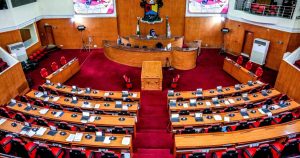Ghana’s banking sector has emerged as a leader in climate resilience within Sub-Saharan Africa, securing the fourth position in a recent Fitch Solutions report. This achievement underscores Ghana’s proactive approach to managing climate-related risks, placing it ahead of several regional counterparts like Rwanda, Senegal, and Kenya. The country’s robust risk management frameworks and strategic investments in digital infrastructure have been instrumental in maintaining operational continuity amidst increasing extreme weather events, a critical factor in a region increasingly vulnerable to climate change impacts. This resilience lays a solid foundation for Ghana’s banking sector to capitalize on emerging opportunities in green finance and sustainable development, potentially attracting significant international investment and solidifying its position as a regional leader.
Ghana’s high ranking reflects a strategic advantage derived from forward-thinking investments and policies. The country’s focus on strengthening risk management frameworks has enabled its banking sector to anticipate and mitigate potential disruptions caused by climate-related events. Furthermore, substantial investments in digital infrastructure have provided a critical buffer against physical risks, allowing for continued operations even during severe weather events. This digital resilience is particularly crucial in a region where extreme weather events like droughts and floods are becoming more frequent and intense. By proactively addressing these challenges, Ghana’s banking sector has positioned itself to not only withstand climate shocks but also to leverage emerging opportunities in the green finance space.
The Fitch Solutions report identifies four primary climate-related risk factors impacting Sub-Saharan Africa’s banking sectors: physical risks from extreme weather events; transition risks associated with adapting to global sustainability regulations; financial market volatility driven by climate disruptions; and limited climate insurance penetration. Ghana’s proactive approach to mitigating physical risks through digital infrastructure investments and robust risk management frameworks addresses the first of these challenges. The country’s strong foundation provides a platform to tackle the remaining risks, positioning its banking sector to lead in the adoption of green financing practices, promoting climate insurance products, and navigating the complexities of evolving sustainability regulations.
Ghana’s high ranking presents a unique opportunity for the country’s banking sector to capitalize on the growing global interest in sustainable finance. By expanding green financing initiatives, supporting renewable energy projects, and promoting sustainable agriculture, Ghanaian banks can attract international investors seeking climate-resilient investment destinations. Leveraging digital banking solutions further enhances operational flexibility and reduces physical risks, while promoting climate insurance products provides crucial financial protection for businesses and households against environmental shocks. With nearly two-thirds of Africa’s economic output tied to natural resources, Ghana’s banking sector is uniquely positioned to support economic diversification and long-term, sustainable growth.
Despite its commendable progress, Ghana must remain vigilant and proactive in addressing evolving climate risks. The Fitch Solutions report highlights the significant economic toll of climate-related disruptions in Sub-Saharan Africa, estimated at $7-15 billion annually, leading to job losses, reduced productivity, and increased loan defaults. To further fortify its resilience, Ghana’s banking sector must continue integrating advanced climate risk analytics into lending and investment decisions. Collaboration with international partners for knowledge sharing on sustainable finance practices and advocating for supportive regulatory frameworks are essential for facilitating climate adaptation and green financing.
The convergence of climate change and global finance presents both a challenge and an opportunity for Ghana’s banking sector. By seizing this moment, Ghana can establish itself as a pioneer in sustainable finance, attracting international capital and driving green innovation. The country’s next steps in navigating the complex landscape of climate resilience will not only determine its own financial stability but also potentially set a benchmark for sustainable banking practices across Africa. The question remains whether Ghana will fully capitalize on its current strengths and proactively address emerging risks to cement its leadership in this critical area. The potential for transformative change is significant, but continued vigilance and strategic action are essential to realize this potential.













